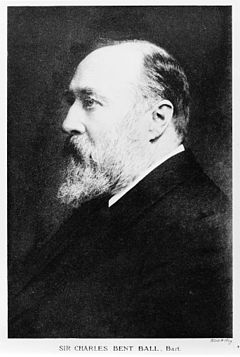Charles Bent Ball
| Sir Charles Bent Ball | |
|---|---|

Obituary portrait of Sir Charles Bent Ball
|
|
| Born | 21 February 1851 Dublin, Ireland |
| Died | 17 March 1916 (aged 65) Dublin |
| Nationality | Irish |
| Education | Trinity College, Dublin |
| Occupation | Surgeon |
| Years active | 1874-1916 |
| Relatives | Robert Ball, Robert Stawell Ball, Valentine Ball, Charles Arthur Kinahan Ball, Nigel Ball |
| Medical career | |
| Profession | Doctor |
| Field | Surgery |
| Institutions | Trinity College, Dublin, Sir Patrick Dun's Hospital |
| Specialism | Abdominal and rectal surgery |
Sir Charles Bent Ball Hon FRCS MD FRCSI (21 February 1851 – 17 March 1916) was an Irish surgeon and an honorary surgeon to the King in Ireland.
Charles Bent Ball was born in Dublin on 21 February 1851, the third and youngest son of the seven children of Robert Ball and Amelia Gresley Ball (née Hellicar). His brothers were astronomer Sir Robert Stawell Ball and the geologist Valentine Ball. Ball attended Trinity College, Dublin (TCD), graduating with a BA in 1871 with a gold medal in natural science, following with an MB and M.Ch. in 1872. Ball won a surgical travelling prize in 1873 to study in Vienna, taking an MD from Dublin University in 1875, becoming a Fellow of the Royal College of Surgeons in Ireland (RCSI) in 1879. He practised as a surgeon at the Blaenavon Iron and Steel Co. in Monmouthshire, Wales from 1874 to 1881, then returning to Dublin to become a medical officer in the Grand Canal St. district.
Ball was appointed assistant surgeon to Sir Patrick Dun's Hospital in 1883, joining Edward Hallaran Bennett, a pioneer in antiseptic surgery in Dublin. Their collaboration resulted in the opening of the first modern antiseptic operating theatre in Ireland in 1898. Ball became the leading surgeon in Ireland working at this hospital from 1895 to 1916, and was amongst the first surgeons to perform extensive abdominal operations. A notable case which Ball operated is referred to as the "chisel case" in 1887, where a boy had perforated his stomach and abdominal vein with a chisel. Ball operated on the boy's abdomen with an abdominal section, suturing the wounds, and ultimately saving the boy's life. This was one of the earliest cases of successfully suturing a lesion of the alimentary canal. Amongst his patients was John Millington Synge, who suffered from Hodgkin's disease.
...
Wikipedia
